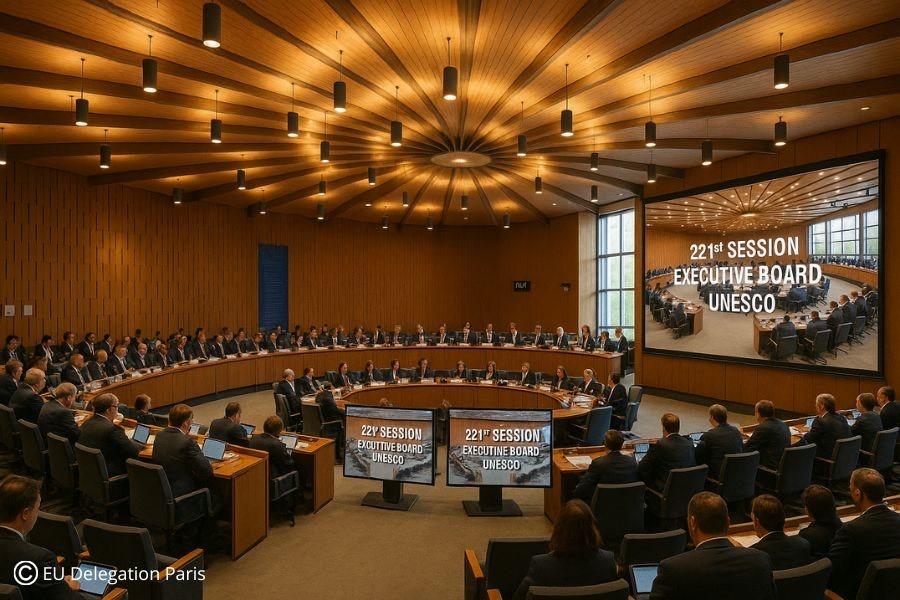EU action at the 221st session of the Executive Board, UNESCO

The 221st session of the UNESCO Executive Board took place from 2 April to 17 April 2025 at UNESCO Headquarters in Paris. During this session, the Board adopted a comprehensive set of decisions addressing key areas such as education, gender equality, diversity, inclusion, and climate action. These decisions underscored UNESCO's commitment to its mandate of promoting peace and sustainable development through international collaboration and marked a significant milestone in advancing multilateral cooperation.
“Today, we find ourselves in an increasingly complex and uncertain geopolitical environment, and multilateralism is under threat from all sides. It has never been so important to work together, collectively, towards a safer, more sustainable and inclusive world for our future generations.
The world is reorganising. The EU will stay a predictable and reliable partner to the UN and our partners around the world. In a world of ongoing global crises and conflicts, the EU reaffirms its steadfast commitment to effective multilateralism and to the rules-based international order with the UN at its core.” Statement on behalf of the EU and 26 Member States at the Plenary Debate of the 221st Session of the UNESCO Executive Board, delivered by Ambassador Christina Kokkinakis, Head of the EU Delegation to the OECD and UNESCO in Paris.
At this session, the EU Ambassador delivered six statements:
Plenary Debate: With its unique and normative mandate, UNESCO can make a meaningful contribution to the implementation of the Pact for the Future, the implementation of the SDGs and fostering global peace and security. The EU-UNESCO partnership has had concrete results on communities – whether it be via the EU-funded Transcultura project to support cultural and creative industries in the Caribbean, the ‘Reviving of the Spirit of Mosul’ initiative in Iraq, or the EU-UNESCO joint project to address rising antisemitism through education in Europe.
Safety of Journalists and the Issue of Impunity: The safety of journalists remains a pressing global concern, with media professionals facing increasing threats, violence, and killings, often with little accountability. UNESCO leads efforts to protect journalists through the UN Plan of Action on the Safety of Journalists and the Issue of Impunity, which promotes legal reforms, national action plans, and monitoring mechanisms. In addition, UNESCO tackles digital threats, particularly online violence against women journalists, by engaging Member States and technology companies within UNESCO’s Guidelines for the Governance of Digital Platforms and the Pact for the Future.
Supporting the continuity of UNRWA’s educational activities in the occupied Palestinian territory: UNESCO is committed to supporting the continuity of educational activities in the occupied Palestinian territories, particularly through collaboration UNRWA. This initiative aims to ensure access to quality education for Palestinian refugees, despite the challenges posed by the ongoing conflict. UNESCO assists UNRWA in addressing issues such as infrastructure damage, limited resources, and displacement, working to maintain educational standards and promote resilience among students. The partnership focuses on improving educational systems, providing teacher training, and supporting the integration of digital learning tools.
UNESCO’s actions and emergency assistance programme for Ukraine: The war in Ukraine has severely impacted education, culture, media, and heritage, prompting UNESCO to scale up its emergency assistance programme. In the field of education, UNESCO is rehabilitating damaged schools, providing digital learning tools, and supporting teachers and students through training and psychosocial support. To safeguard cultural heritage, the Organization is monitoring damage, delivering technical and financial assistance, and supporting the restoration of endangered sites under the #Unite4Heritage initiative. In the media sector, UNESCO works to protect journalists, combat disinformation, and strengthen the resilience of independent media outlets.
Assessment of the situation in Lebanon in connection with UNESCO’s mandate, and UNESCO’s plan of action: The situation in Lebanon continues to impact education, cultural heritage, and freedom of expression, prompting UNESCO to implement a Plan of Action focused on safeguarding heritage, supporting education in emergencies, and promoting freedom of expression. The Executive Board welcomes the actions taken to ensure the continued implementation of the emergency assistance programme for Lebanon through the mobilization of relevant partners, and to report further on the implementation of the Action Plan at the 222nd session.
Assessment of the situation in Syria in connection with UNESCO’s mandate: It highlights Syria’s rich cultural heritage, including UNESCO World Heritage sites, and the destruction caused by the conflict, which has affected all aspects of society. UNESCO is called upon to provide its expertise in key areas such as education, culture, communication, and information to assist in the country’s reconstruction.
Throughout the session, the EU focused on the following priorities:
- Advancing the 2030 Agenda for Sustainable Development and the SDGs.
- Promoting quality education for all.
- Reinforcing the importance of freedom of expression.
- Supporting UNESCO’s efforts in crisis-affected regions — particularly Ukraine, Gaza, Sudan, and Syria — by emphasizing the critical role of education and cultural preservation in peacebuilding.
- Reaffirming its support for UNESCO's initiatives.
All statements delivered by the EU Ambassador at the 221st Session of the UNESCO Executive Board can be found here.




